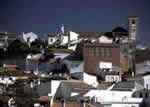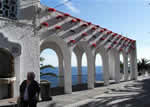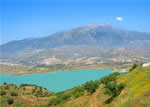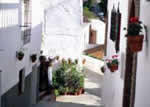Reality TV? Oh come on. It's about as 'real' as politician's honesty. Sure the candidates don't follow a script, but they know the score (or at least they think they do) and they are carefully handpicked to be the sort of oddball wannabes that will make the whole audience feel better about themselves by contrast.
Reality TV is a sign of decline. At the dawn of the TV age we demo-ed national service broadcasting: pompous and prescriptive but educational and informative. In the 50s we came up with the Ealing comedies. In the 80s we at least still showed the country's key sporting events on non-subscription channels. Now we have infected the world with “reality TV”.
I'm not saying we should all sit down to a speech from the Queen, a documentary on fly-fishing and a worthy channel four play every night. I'm just sick of faked-up voyeurism being the only alternative to wall-to-wall game shows. The game shows are set-ups as well (but that's another story).
I'm not objecting to off-script programmes. Before 'reality' we had documentaries, which attempted to look at and describe reality in a coherent way, and remain one of the most interesting kinds of TV…and therefore, no doubt, unpopular. There are even a few programmes from this nasty category that I can concede have a purpose. Watching expert dog-trainers teach stupid people (who can't understand that hitting their dog 5 hours after it has pooed on the carpet won't teach it not to do so) the basics of dog training can help less stupid people learn…the basics of dog training. And also make them feel better about themselves for not being quite as brainless as that daft macho git embarrassedly struggling to master Rambo, and failing. Ditto 'Super-Nanny': you wouldn't, in total frustration, nearly drag a six year old boy down a flight of stairs by his heels, but you might as a despairing parent learn one or two new tricks. Ditto, ditto, How Clean is Your House? How Daring is Your Sex-Life? How Smug is Your Patio? etc.
But all this stuff could be taught in a trice, a bit more directly. In fact, some of it is. Robert Winston's 'Child of our Time' series edges into 'reality TV' while harking back to the '7 up' documentaries. He has followed a group of families who had a kid in 2000 with progressive updates. But he rescues it from banality by thinking about life-stages; not just presenting the kids or families with 'challenges', but showing why they react in different ways and fully following it up with what the parents can do for the best. The same is true of all the other programmes. The ones that show the most How-Tos and Whys are at the outside edge of the genre: the original reality show – big brother – is as empty of analysis as George Bush's head.
Reality TV? Oh come on. It's about as 'real' as politician's honesty. Sure the candidates don't follow a script, but they know the score (or at least they think they do) and they are carefully handpicked to be the sort of oddball wannabes that will make the whole audience feel better about themselves by contrast
It's so snobby. They pack a house with a bunch of desperate fame-seekers and then juice up the tacky way they behave. People being political animals, sure we are all interested in people watching, and tend to like to see and comment on others, especially with all the comfort of judging without being judged. But the contestants are picked to be desperately dysfunctional, to give the programme makers hope of all the drama of bad, nasty, stupid and ludicrous behaviour so they can analyse the house politics on 'little brother' with proper superiority.
It reaches its nadir when it is combined with celebrity, as in Celebrity Island etc. Of course the contestants are dropouts, one-hit wonders and has-beens, desperate for a return to fame even if that fame consists of turning themselves into fun-fair grotesques. I remember laughing along with Clive James who loved to show clips from Japan's horrible “Endurance” programme. Competitors tried to outlast each other through increasingly horrible 'challenges' for a big cash prize, while the camera zoomed in on their tortured faces to enjoy their suffering. We laughed because we couldn't credit the bizarre nature of the challenges. We laughed uncomfortably because we couldn't credit that a TV company could profit so patently from sadism. We laughed because we couldn't credit that anyone would put themselves through that, for the sake of fame and money. And now we produce programme after programme in the same vein.
It's so sad that fame is so prized that people will humiliate themselves for it. How can people think fame this important? Not fame for doing something, achieving something, being something, just fame from being seen on TV or in the papers. Why do people want to be recognized in the street by others for 'being that prat who did the dance in the cat suit', or 'the one who squirted a banana milkshake down his nose'? Bear in mind that kids are deeply impressed by celebrity culture with most following and copying the behaviour of these non-entities and, oh-god-no, aspiring to be like them. I don't understand it.
But this is all Brit TV. Here we are living in Spain: our many fellow ex-pats and our next-door neighbours don't watch the dross showered down our satellites. They have their own. Of course, Spanish TV has long led the world in terms of banal, crass, crude, sleazy, tedious, atrocious programming. If anything it has improved in the past ten years or so: it is now merely dire. But they have found a most unlikely mentor in picking up from the UK the utter drivel that we have led the way in.
Yes, Britain can proudly say it infected the world with the most unreal 'reality', fools gold, life as it genuinely isn't lived, a take over from religion as the opiate of the people: crap TV. And holy cow, is it popular! Gran Hermano, La Isla de los Famosos, Abre la Caja…there's a super-montón of junk out there just waiting to be winced at. There is one big advantage, though, in watching the local gutter-programming. You might just improve your Spanish. Now, can anyone tell me what “¡Que te folle un pez!” means, please?



















